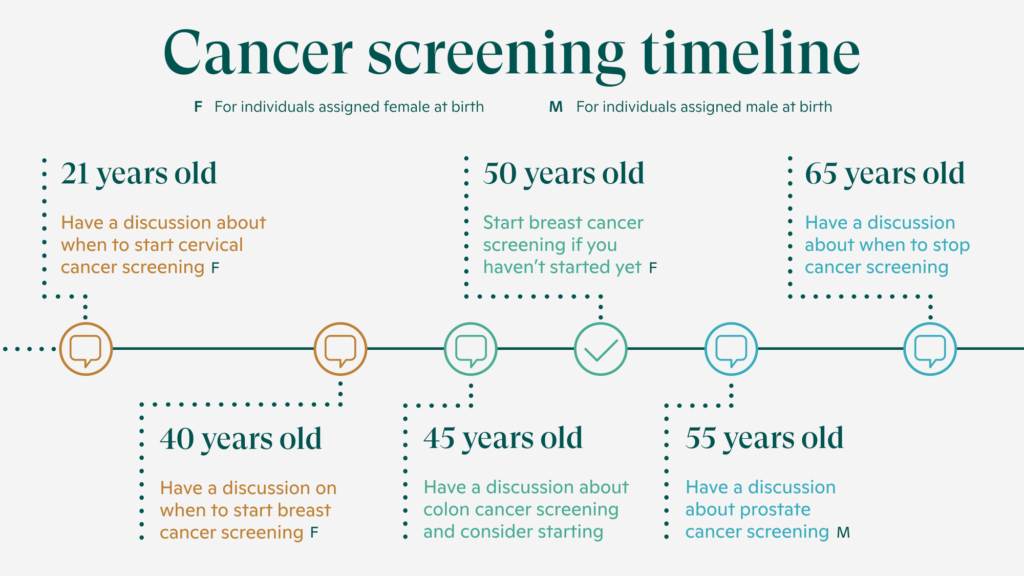Don’t Miss Your Window: A Guide to Common Cancer Screenings (Ages 40-80)
Share IT

Launch Your Dream Website with Us!
Click Here to Get in touch with Us.
Categories
Cancer Screening Guide
A Guide to Common Cancer Screenings: Early Detection Saves Lives
Early detection of cancer can lead to better treatment outcomes and perhaps save lives, which is why cancer screening is so important. This is a thorough analysis of the recommended screening protocols for the five most prevalent cancers: lung, colorectal, cervical, prostate, and breast.
Thank you for reading this post, don't forget to subscribe!Table of Contents

Breast Cancer:
Cancer Screening Guide
Who: At age 40, women who are at average risk may choose to start getting mammograms. Between the ages of 45 and 54, the American Cancer Society advises yearly mammograms; starting at age 55, mammography should be done every other year.
Why? Because mammography may identify breast tissue anomalies using low-dose X-rays, it may be able to detect cancer before symptoms manifest.
Things to Think About Talk about any personal history of abnormal breast biopsies, family history of breast cancer, or any risk factors you may have with your doctor. Some of the drawbacks of mammography are false positives and the possibility of unneeded biopsies.
Colorectal Cancer:
Cancer Screening Guide
- Who: Adults with average risk should start screening at age 45.
- Tests: There are a number of techniques available, such as visual examinations like sigmoidoscopy or colonoscopy to directly examine the colon and rectum for polyps (precancerous growths) and stool tests (FIT, Cologuard) that look for concealed blood.
- Frequency: Depending on the test selected, different screening intervals apply. Annual stool tests may be performed, and if no polyps are detected, a colonoscopy may be suggested every ten years.
- Benefits: Polyps can be removed at an early stage before they become cancerous.
Breast Cancer:
Cancer Screening Guide
- Who: At age 25, screening ought to start.
- Tests: The Pap test looks for unusual alterations in the cervix’s cell structure that might point to precancer. The human papillomavirus, or HPV, test finds the virus responsible for the majority of cervical malignancies.
- Frequency: Depending on the test kind and age, recommendations change. While a co-test, or combination HPV and Pap test, may be performed every five years, a Pap test alone may be performed every three years.
- Importance: Treating precancerous alterations early on can stop the development of cervical cancer.
Cancer of the Prostate:
Cancer Screening Guide
- Who: It’s difficult to decide whether to have a prostate cancer screening. Men who are at average risk can talk to their doctor about screening options as early as age 45. Men who are African American or have a family history may need to think about screening sooner.
- Exams: PSA levels, which may be increased in prostate cancer, are measured by a blood test for prostate-specific antigen (PSA). During a digital rectal exam (DRE), the physician can feel the prostate to check for anomalies.
- Take into account: False positive results from PSA tests can result in needless biopsies. Before choosing a screening, talk to your doctor about the possible advantages and disadvantages.
Lung Cancer:
Cancer Screening Guide
- Who: Not everyone should get screened for lung cancer. For persons aged 50 to 80 who have smoked one pack of cigarettes a day for thirty years or two packs a day for fifteen years, and who are presently smokers or have quit within the last fifteen years, the USPSTF recommends yearly low-dose CT scans.
- Benefits: Treatment results for lung cancer can be enhanced by early detection.
- Things to think about: There are drawbacks to low-dose CT scans, including as radiation exposure and possible false positives.
Important Things to Bear in Mind:
Cancer Screening Guide
To find the best screening methods for you, talk to your doctor about your specific risk factors.
Screening exams may have drawbacks and are not infallible.
For cancer treatment to be successful, early detection is essential.
Cancer risk can be decreased by leading a healthy lifestyle that includes frequent exercise, a balanced diet, and weight maintenance.
Recall that this material is meant to be general knowledge and shouldn’t be used in place of advice from a medical professional. For specific screening recommendations based on your unique health history and risk factors, always see your physician.

Launch Your Dream Website with Us!
Click Here to Get in touch with Us.





























































Recent Comments